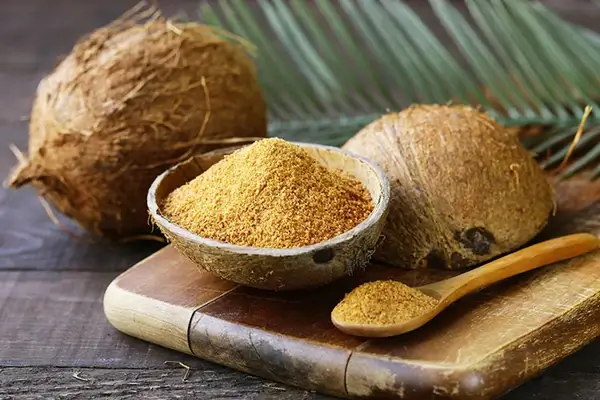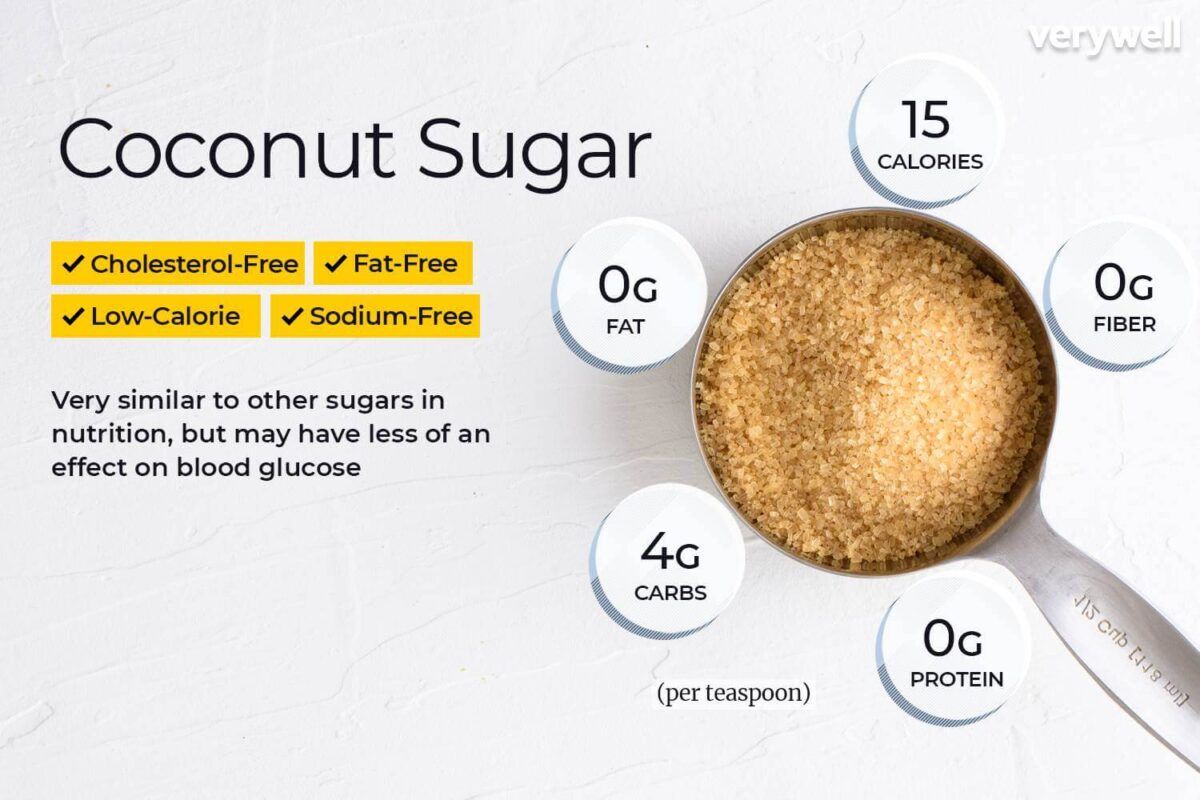For centuries, coconut trees have been revered for their versatile and nutritious products, including coconut oil, coconut milk and coconut water. In recent years, another coconut-based product has gained popularity as a healthier alternative to traditional sweeteners: coconut sugar.
Table of Contents
Coconut sugar, also known as coconut palm sugar or coco sugar, is made from the sap of the coconut palm tree. It has a similar taste and texture to brown sugar, but it contains more nutrients and has a lower glycemic index. In this article, we will explore the benefits of using coconut sugar, its nutritional profile, culinary uses and environmental impact.
Why is coconut sugar a healthier alternative to traditional sweeteners?

Coconut sugar has several advantages over traditional sweeteners such as white sugar and corn syrup. Here are some reasons why you should consider switching to coconut sugar:
- Low glycemic index: Coconut sugar has a lower glycemic index than regular sugar, which means it causes a slower and steadier rise in blood sugar levels. This makes it a better option for people with diabetes or those trying to avoid blood sugar spikes.
- Nutrient-dense: Coconut sugar contains several vitamins and minerals such as iron, zinc, calcium and potassium. It also contains antioxidants and inulin, a type of dietary fiber that promotes gut health.
- Unrefined and natural: Unlike white sugar and corn syrup, which undergo several refining processes, coconut sugar is minimally processed and retains its natural nutrients and flavor. It is also free of artificial additives and preservatives.
- Sustainable and eco-friendly: Coconut palm trees require less water and pesticides than other crops, making them more sustainable option. Coconut sugar production also generates less waste and carbon emissions compared to other sweeteners.

In addition, coconut sugar is also a great choice for those who follow a plant-based or gluten-free diet, as it is vegan-friendly and gluten-free. It is also minimally processed and free of artificial additives, making it a healthier and more natural option.
When using coconut sugar in recipes, it’s important to note that it has a slightly different taste and texture than white sugar, so adjustments may be needed. However, it can be used as 1:1 substitute for brown sugar in most recipes and can also be dissolved in beverages or used in savory dishes.
Overall, coconut sugar is a versatile and nutritious sweetener that can be a great addition to healthy diet. With its lower glycemic index, nutrient density and sustainability, it’s definitely worth giving it a try. So next time you’re in the mood for something sweet, consider using coconut sugar and enjoy its delicious and healthful benefits!
Nutritional profile of coconut sugar
Coconut sugar is not only delicious but also nutritious. Here is breakdown of its nutritional profile per 100 grams:
- Calories: 375
- Carbohydrates: 90 grams
- Fiber: 1 gram
- Protein: 1 gram
- Fat: 0 grams
- Iron: 2.1 milligrams (12% of the daily value)
- Zinc: 0.3 milligrams (3% of the daily value)
- Calcium: 16 milligrams (2% of the daily value)
- Potassium: 103 milligrams (2% of the daily value)
Organic coconut sugar
Organic coconut sugar is a natural sweetener made from the sap of coconut trees. It is often touted as a healthier alternative to table sugar, as it is minimally processed and retains many of its natural properties.
One of the primary benefits of organic coconut sugar is that it is produced without the use of synthetic pesticides, fertilizers or other harmful chemicals. This means that it is free from potentially harmful residues that can be found in conventionally grown crops.
Organic coconut sugar also contains small amounts of vitamins and minerals, including iron, zinc, calcium & potassium. While these amounts are not significant enough to provide a substantial nutritional boost, they can contribute to an overall healthy diet.
Additionally, organic coconut sugar has a lower glycemic index (GI) than regular sugar. This means that it is absorbed more slowly by the body, leading to a gradual rise in blood sugar levels rather than a rapid spike. This can be particularly beneficial for people with diabetes or those who are trying to manage their blood sugar levels.
It’s important to note that while organic coconut sugar is a natural sweetener, it is still a source of carbohydrates & should be consumed in moderation. It should not be considered “health food” or replacement for a balanced diet.
In summary, organic coconut sugar is a natural and minimally processed sweetener that may offer some health benefits. It is produced without synthetic pesticides or other harmful chemicals, contains small amounts of vitamins and minerals and has a lower glycemic index than regular sugar. However it should be consumed in moderation as part of a balanced diet.
Culinary uses of coconut sugar
Coconut sugar is a versatile ingredient that can be used in a variety of recipes, from baked goods to savory dishes. Here are some culinary uses of coconut sugar:

- Baking: Coconut sugar can be used as a 1:1 substitute for brown sugar in most recipes. It adds a caramel-like flavor and moisture to baked goods such as cookies, cakes and muffins.
- Sweetening beverages: Coconut sugar can be dissolved in hot or cold beverages such as coffee, tea and smoothies. It adds a natural sweetness and depth of flavor to drinks.
- Cooking: Coconut sugar can be used in savory dishes such as stir-fries, curries and marinades. It adds a hint of sweetness and balances out spicy or acidic flavors.
Also Read: Sugar Alternatives: A Guide to Healthy Sweeteners
Conclusion
Coconut sugar is a delicious and nutritious alternative to traditional sweeteners. It has lower glycemic index, contains more nutrients and is more sustainable and eco-friendly than white sugar and corn syrup. Coconut sugar can be used in a variety of recipes, from baked goods to savory dishes, adding a natural sweetness and depth of flavor. So why not give coconut sugar a try and enjoy healthier and more sustainable sweetener option?
FAQs
Is coconut sugar vegan-friendly?
Yes, coconut sugar is vegan-friendly as it is derived from the sap of the coconut palm tree.
Can coconut sugar be used for people with diabetes?
Yes, coconut sugar has a lower glycemic index than regular sugar, which means it causes a slower and steadier rise in blood sugar levels. However, people with diabetes should still use it in moderation and consult with their healthcare provider.
Is coconut sugar gluten-free?
Yes, coconut sugar is gluten-free and can be used as a sweetener for people with celiac disease or gluten intolerance.
Can coconut sugar be substituted for white sugar in recipes?
Yes, coconut sugar can be used as a substitute for white sugar in most recipes. However, it has a different taste and texture, so you may need to adjust the amount and other ingredients in the recipe accordingly.

Rupesh Sagvekar is Content writer, Food blogger and owner of Manvik Foods, an online shop in Mumbai, India that specializes in selling high-quality dry fruits, nuts, berries, whole and powdered spices. Under the authority of Manvik Enterprises Organisation, Rupesh and his team believe that quality is of the utmost importance. They take great care to ensure that their products are verified, tested, and of the best possible quality. Rupesh’s goal is to make sure that every customer is satisfied with what they receive from Manvik Foods.
As an Amazon affiliate, Manvik Foods ships their products all over India, allowing customers from all corners of the country to enjoy their delicious and nutritious products. With Rupesh at the helm, Manvik Foods has become known for their commitment to quality, exceptional customer service, and passion for healthy, natural foods.




